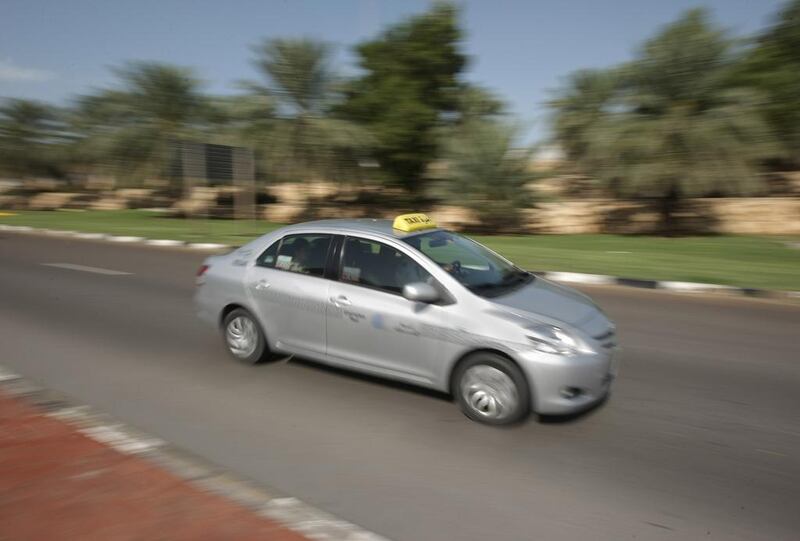ABU DHABI // Taxi drivers are considered the most dangerous drivers on the road, the survey reveals.
Of the 1,208 residents polled, 32 per cent said they considered cabbies to be the most dangerous, followed by young drivers (26 per cent) and lorry drivers (22 per cent).
Sameer Afridi, 27, a Pakistani driver who works for Al Ghazal Taxi, one of the six franchise-holding companies in Abu Dhabi, said he was aware of the public’s negative perception of cabbies.
“Some people are saying we are dangerous,” he said. “But they must understand that many of us work long hours to make money.”
Taxi drivers who worked up to 18 hours a day could pose a danger to everyone on the road, he said.
“They will feel tired and sleepy and tend to drive recklessly,” said Mr Afridi, who works 12 hours a day and has one day off each week.
“But many of us are well-experienced and don’t jump the red light, make safe lane changes and give way to pedestrians.”
Unlike Mr Afridi, the majority of cabbies did not have a day off each week, said Amar Katuwal, 29, from Ithar, Nepal, who had driven a National Taxi silver cab for three and a half years.
“We are not dangerous drivers,” he said. “We are professional drivers who follow the traffic rules. Driving is not a pastime. It’s our job.”
He has to work for up to 13 hours to meet his Dh450 daily target and earn between Dh3,000 and Dh3,500 a month. He does not have a day off.
“I try to keep a safe distance between my taxi from the car in front,” he said. “I wear a seat belt, use indicators and use a headset if I need to take a call when driving.”
In February, The National reported that many passengers were urging taxi drivers to stop using their mobile phones after fears of it causing an accident. The penalty is Dh200 and four black points on the driver's licence.
More than half of those surveyed, 54 per cent, said they did not feel as safe riding a cab compared with being in their own vehicle.
“I am far more experienced than other drivers on the road,” said Mohammed Nazir Aziz, a cabbie who joined Arabia Taxi 18 months ago. “I got my UAE licence in 1988 and worked as a company driver in Al Ain for 10 years.”
He believed younger drivers were the most dangerous on the road.
“They like to drive fast,” he said. “If we go above the speed limit, we receive a warning and are fined.”
The Centre for Regulation of Transport by Hire Cars, commonly known as TransAD, has an automated fining system and speed limits, monitored through the tracking and dispatch centre.
Tougher rules for the city's 10,000 taxi drivers were introduced in March. The aim was to reduce the number of crashes involving cabs by 50 per cent.
Drivers who exceed the speed limit will now only receive one warning per day. If they speed a second time, they will be fined.
If a driver exceeds the speed limit by 20kph or more, the meter will shut down immediately and the driver will be investigated.
“In the UAE, we strictly follow the traffic rules and avoid being involved in an accident,” Mr Afridi said.
“People here are to earn money, not to waste money on fines.”
The centre also promoted good driving behaviour by providing incentives to drivers on a monthly and annual basis.
A number of taxi drivers were rewarded this month for a range of achievements, including safe driving, honesty in returning lost items, achieving the highest response rate to taxi-booking requests, providing excellent customer service and for the highest usage rates of compressed natural gas.
rruiz@thenational.ae






